Politics nowadays has become more than governance; it has entrenched itself in every facet of life. This is a reality that must be confronted with the clarity it demands.
In a country where institutions are easily swayed and systems are routinely exploited, political power is the most valuable currency. It buys not only legislation but also loyalty. It shields the corrupt, rewards the ambitious, and paves the way for dynasties to take root and spread across regions, even down to barangay levels. There is no longer a meaningful distinction between public service and self-promotion; both are folded into a single pursuit—the capture of political office. From procurement contracts to appointments in schools, hospitals, courts, and even church-backed charities, decisions are often dictated by political convenience, not competence or morality.
This is precisely why the appetite for politics is insatiable. People are not salivating over politics for the public good—they are lusting after the power it holds. Where politics is king, money follows. Influence flows. Fame becomes inevitable. These are the very things most people chase. Not virtue, not service, not reform—but position. Because political success ensures visibility, wealth, and immunity. It is the shortcut to relevance in a society that values connections over credentials. Even those who have no business entering public life are emboldened to run for office because the rewards far outweigh the risks. In truth, politics has become the fastest way to become somebody.
The danger lies in how political influence now contaminates even the most apolitical corners of daily life. University deans owe their chairs to the mayor’s endorsement. Police officers are reassigned based on campaign allegiances. Judges, if not corrupted, are often pressured into submission. Job applications in government agencies require more than a résumé—they need a referral from someone “with weight.” Even cultural awards, scholarships, and media appointments are not immune. This is no longer just political maneuvering; this is a full-blown infestation of politics in the private and professional aspirations of citizens.
Certainly, systemic safeguards must be reinstated and enforced. Merit must trump affiliation. The rule of law must be upheld regardless of political clout. Political education should begin at the earliest levels of schooling, not to romanticize politics, but to teach discernment, civic duty, and limits to power. Most importantly, the people must learn to treat politics not as a ladder to personal gain, but as a burden of accountability. Only then can society reclaim the spaces it has lost to this political overreach.




